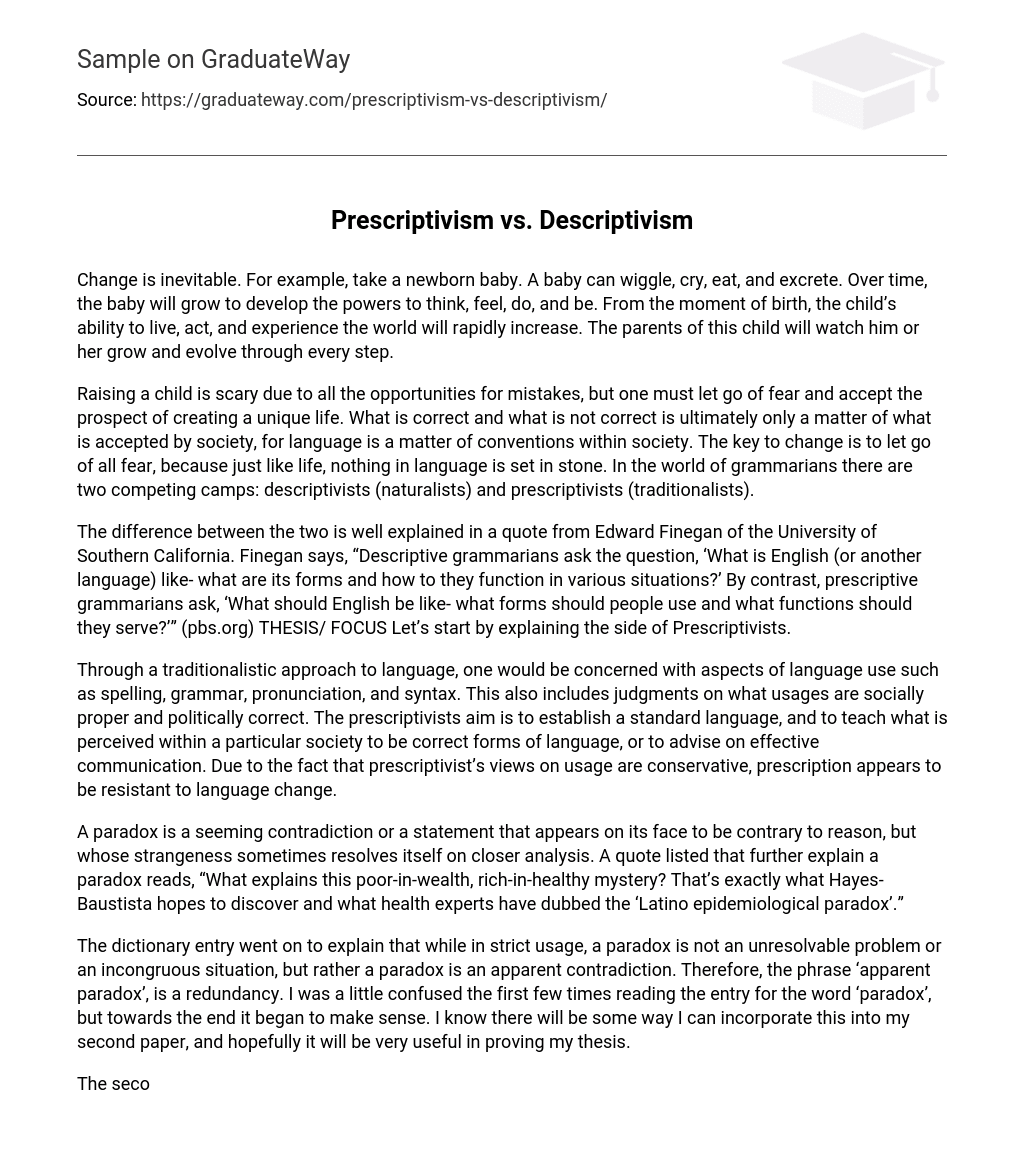Change is inevitable. For example, take a newborn baby. A baby can wiggle, cry, eat, and excrete. Over time, the baby will grow to develop the powers to think, feel, do, and be. From the moment of birth, the child’s ability to live, act, and experience the world will rapidly increase. The parents of this child will watch him or her grow and evolve through every step.
Raising a child is scary due to all the opportunities for mistakes, but one must let go of fear and accept the prospect of creating a unique life. What is correct and what is not correct is ultimately only a matter of what is accepted by society, for language is a matter of conventions within society. The key to change is to let go of all fear, because just like life, nothing in language is set in stone. In the world of grammarians there are two competing camps: descriptivists (naturalists) and prescriptivists (traditionalists).
The difference between the two is well explained in a quote from Edward Finegan of the University of Southern California. Finegan says, “Descriptive grammarians ask the question, ‘What is English (or another language) like- what are its forms and how to they function in various situations?’ By contrast, prescriptive grammarians ask, ‘What should English be like- what forms should people use and what functions should they serve?’” (pbs.org) THESIS/ FOCUS Let’s start by explaining the side of Prescriptivists.
Through a traditionalistic approach to language, one would be concerned with aspects of language use such as spelling, grammar, pronunciation, and syntax. This also includes judgments on what usages are socially proper and politically correct. The prescriptivists aim is to establish a standard language, and to teach what is perceived within a particular society to be correct forms of language, or to advise on effective communication. Due to the fact that prescriptivist’s views on usage are conservative, prescription appears to be resistant to language change.
A paradox is a seeming contradiction or a statement that appears on its face to be contrary to reason, but whose strangeness sometimes resolves itself on closer analysis. A quote listed that further explain a paradox reads, “What explains this poor-in-wealth, rich-in-healthy mystery? That’s exactly what Hayes-Baustista hopes to discover and what health experts have dubbed the ‘Latino epidemiological paradox’.”
The dictionary entry went on to explain that while in strict usage, a paradox is not an unresolvable problem or an incongruous situation, but rather a paradox is an apparent contradiction. Therefore, the phrase ‘apparent paradox’, is a redundancy. I was a little confused the first few times reading the entry for the word ‘paradox’, but towards the end it began to make sense. I know there will be some way I can incorporate this into my second paper, and hopefully it will be very useful in proving my thesis.
The second entry I decided to profile was ‘mistreat’ and ‘maltreat’. Most critics have differentiated between these two terms. “To Mistreat” is to treat badly or wrong. The word suggests a deviation from some accepted norm of treatment. This deviation is always towards the bad. “To maltreat” is to abuse, to handle roughly or cruelly, is to mistreat in a special way. The words are often used interchangeably, but maltreat is usually restricted to the rougher forms of ‘mistreating’.
These words and their definitions will be very easy to include in my next paper on the debates surrounding usage and style. I decided that because my focus while reading this dictionary was on the topic of usage, I would look up was the word ‘usage’. I found it surprising that the entry for this word in a usage dictionary was rather small. The entry stated that usage generally refers to an idiom or form of speech. I was disappointed that were was to depth to this particular definition, because I was hoping I could glean something useful to inspire me on the next paper.
The final word I decided to look up was ‘rhetoric’. The definition explains that ‘rhetoric’ is the art of using language persuasively where the rules help one to achieve eloquence in an argument or discussion. In The Working Principles of Rhetoric, John F. Genung said, “Rhetoric is the art of adapting discourse, in harmony with its subject and occasion, to the requirements of a reader or hearer”.
I’m not exactly sure how I am going to incorporate the information I found through the definition of ‘rhetoric’, but I know I will be able to. All in all, I think that this word journal on Garner’s Dictionary of Modern American Usage was a complete success. I found a lot of information that will be helpful to me when developing my argument on the debates surrounding the topic of usage. “What you leave behind is not what is engraved in stone monuments, but what is woven into the lives of others” –Pericles (Ancient Greek Politician)





